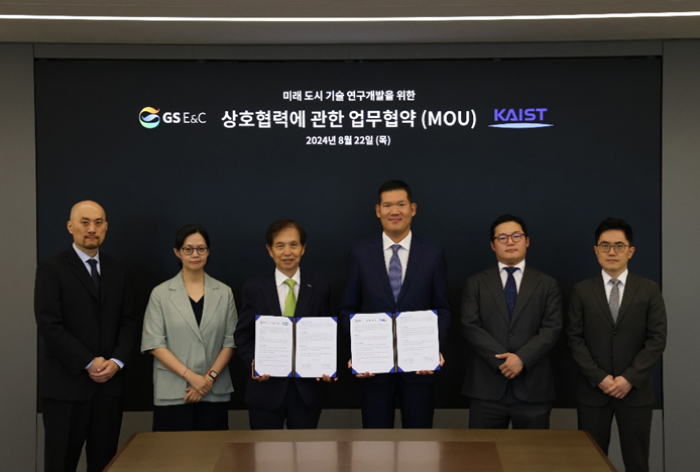SMART CITY
SMART INNOVATION
WEBZINE2024 Vol.07, No.2
All about Lab
Transportation Research and Urban Engineering Laboratory
TRUE Lab
-
- The Transportation Research and Urban Engineering (TRUE) Lab is dedicated to advancing the study of transportation and urban science, with a particular focus on data mining and artificial intelligence, with their implications for urban environments. Under the leadership of Professor Yoonjin Yoon, an Associate Professor in the Department of Civil and Environmental Engineering at KAIST, the lab bridges multiple disciplines. This interdisciplinary approach is reflected in Professor Yoon’s joint appointments in the Graduate School of Artificial Intelligence and the Graduate School of Data Science, highlighting the lab’s commitment to integrating AI and data-driven methodologies into transportation and urban studies.
-
- TRUE Lab’s research spans from fundamental data analysis to the application of complex data science techniques. The lab focuses on enhancing the intelligence of urban systems, optimizing transportation efficiency, and promoting sustainable urban mobility. Such comprehensive research allows TRUE Lab to study not just isolated aspects but the interconnected elements of urban spaces, aiming to create smarter, yet sustainable cities. Additionally, the lab’s extensive global research network plays a crucial role in its collaborative efforts, allowing TRUE Lab to incorporate diverse perspectives and cutting-edge innovations.
- The major research topics at TRUE Lab include, but are not limited to:
- 1.
Computational Transportation Science
- 2.
Urban Intelligence
- 3.
Sustainable Urban Mobility
- 1) Computational Transportation Science
-
Traffic Forecasting

- Traffic forecasting problem is a research area in transportation engineering that has flourished over the last couple of decades, and has recently started to garner broader research interest as a key technical enabler of adaptive traffic management. The primary challenge lies in accurately capturing spatial-temporal variations, which are essential for making precise and reliable traffic predictions in complex real-world environments. To address this gap, our goal is to model the intricate spatial and temporal dependencies within traffic data effectively while incorporating essential network features such as speed limit, distance, and flow direction, thereby enhancing the accuracy and reliability of traffic forecasts.
-
Transportation Network Science
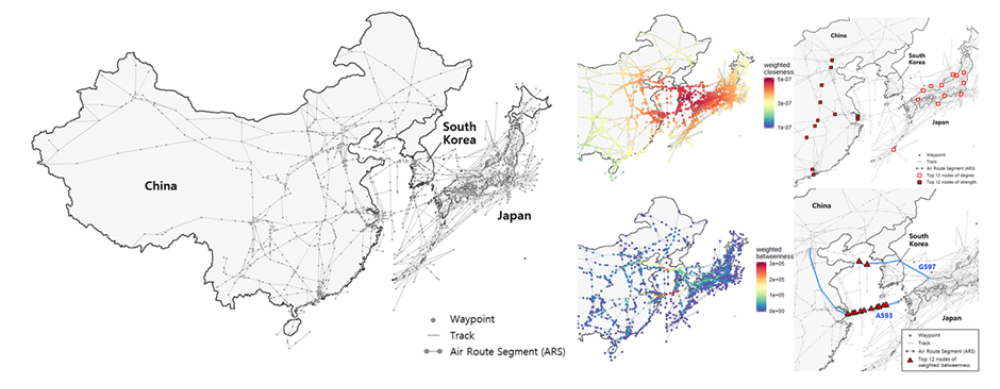
- Transportation network science provides insights into the connectivity, resilience, and optimization of transportation networks. One application of transportation network science is the study of Air Transport Networks (ATNs). Over the past few decades, ATNs have been modeled as airport networks, where airports are represented as nodes and direct flight connections between them as edges. This modeling approach focuses on the airline service network, excluding the airspace where most operational resources are consumed. In this context, our study assessed the robustness of the rapidly growing air route network in Northeast Asia by evaluating node criticality, which helps to identify key airports that are crucial for maintaining the network's overall stability and efficiency.
-
Traffic Forecasting
- 2) Urban Intelligence
-
Urban Region Representation Learning
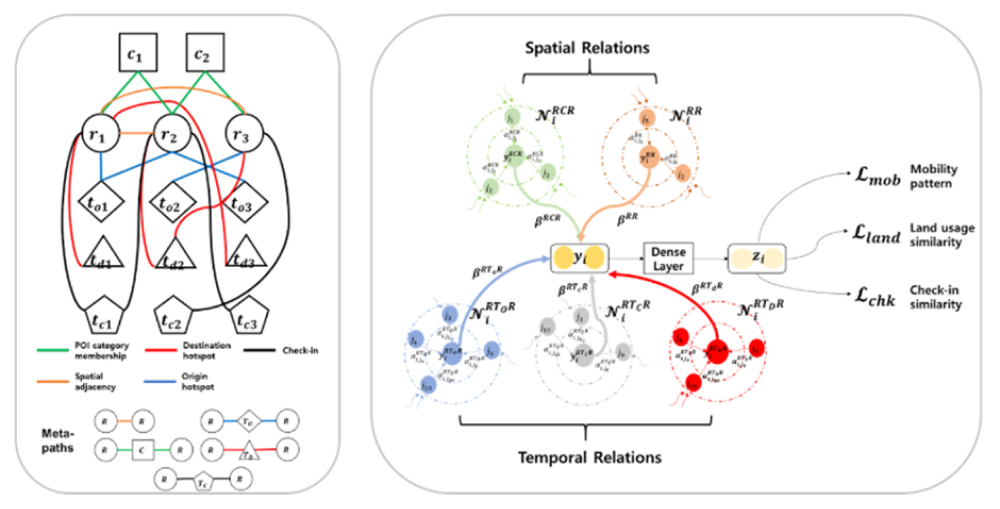
- Urban intelligence refers to the application of advanced technologies, data analytics, and artificial intelligence (AI) to understand, manage, and improve the functioning of urban environments. This approach is essential for uncovering hidden patterns within cities, which is crucial for grasping their dynamics and making them smarter and more efficient. Recent studies suggest that learning representations of urban regions can effectively reveal their intrinsic characteristics, which is a key aspect of urban intelligence. By leveraging both static data (such as POI, geo-spatial contiguity, and land use) and dynamic data (including taxi trips and check-ins), we can capture these features comprehensively. Using AI methods, we extracted urban region embeddings that reflect the core attributes of geographical spaces, enabling a deeper understanding and more informed management of urban environments.
-
Urban Region Representation Learning
- 3) Sustainable Urban Mobility
-
- Urban Air Mobility (UAM) and Unmanned Aerial Systems (UAS) are pivotal in advancing sustainable mobility within urban environments. Both UAM and UAS represent a shift towards smarter, more efficient urban mobility solutions, helping cities to meet their sustainability goals while improving the quality of life for residents.
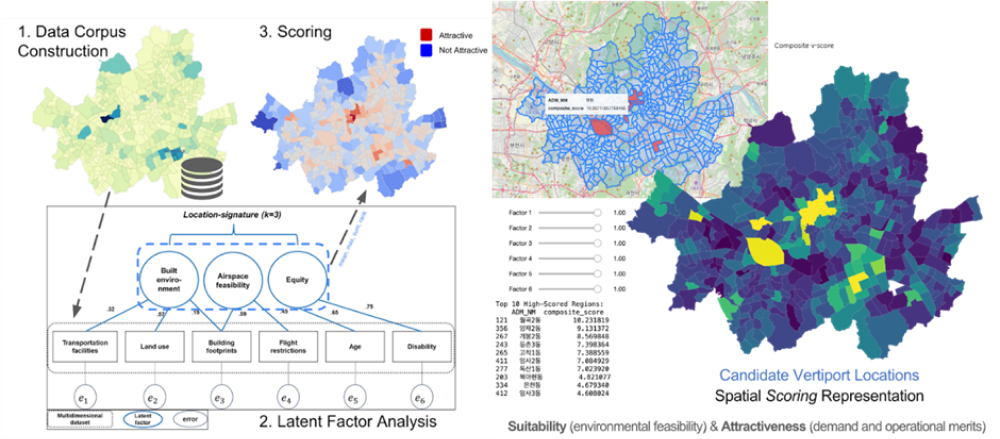
- Vertiports are imperative infrastructure for the adoption of UAM into urban environments. To be sustainable and efficient, studies on their optimal placement are being actively conducted. While much of the research focuses on estimated demand, expert opinions, and/or layered geospatial data, we emphasize the importance of understanding urban dynamics through relevant socio-economic and census data. Through a designed framework that strategically identifies these factors shaping our urban spaces, we strive to find optimal regions for vertiports at the early stages of UAM integration.
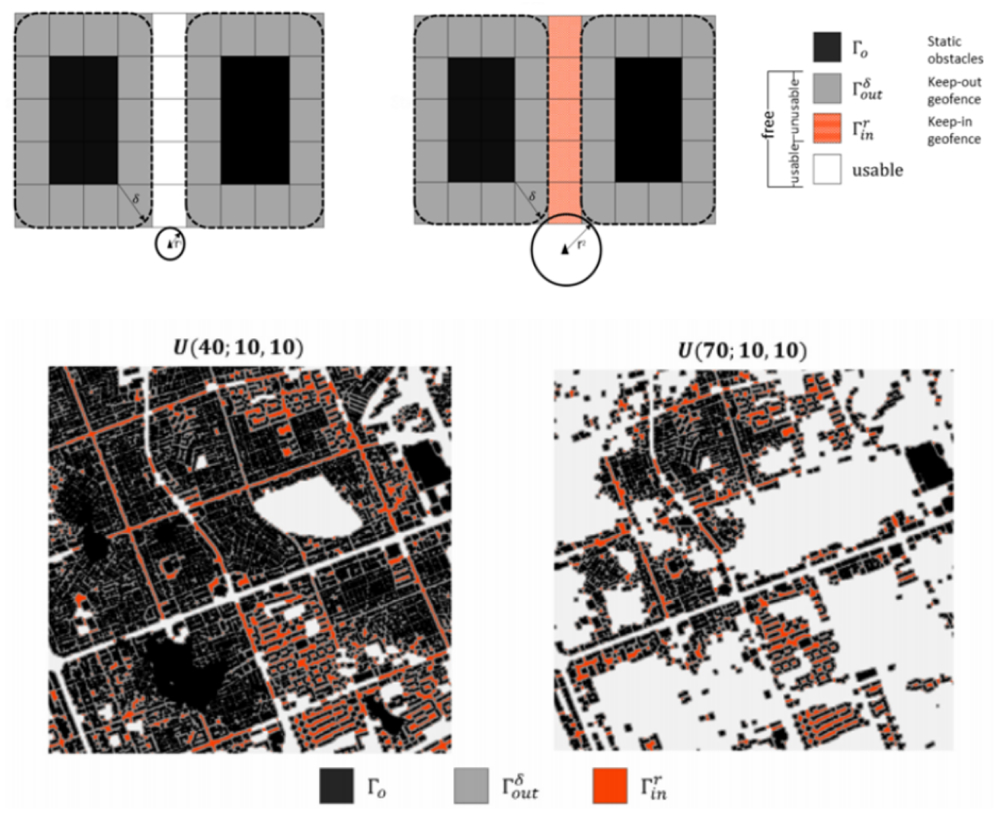
- One of the key challenges in enabling large-scale UAS operations at low altitude lies in the limited airspace of densely built-up urban environments. Unlike the high-altitude controlled airspace, the geospatial complexity arising from existing static obstacles such as buildings and terrain poses a new challenge in the UAS traffic flow management. To address this, we developed an airspace availability assessment framework for UAS operations and conducted research to evaluate the connectivity of urban airspace, focusing on its underlying geometrical and topological properties.
-
-
[Nov. 2022] KAIST-NYU Center for Cities and Climate Change (KN-C³)
- KN-C³ is a joint research center between KAIST and NYU, focuses on exploring scientific and AI-driven responses to deepening urban problems and climate change. Professor Yoon serves as the Faculty Director of KN-C³.
(https://c3.kaist.ac.kr/)
- KN-C³ is a joint research center between KAIST and NYU, focuses on exploring scientific and AI-driven responses to deepening urban problems and climate change. Professor Yoon serves as the Faculty Director of KN-C³.
-
[Nov. 2022] Urban@KAIST
- Professor Yoon leads Urban@KAIST, a school-wide initiative aimed at harnessing pivotal engineering proficiencies to address challenges within the urban landscape.
(https://urban.kaist.ac.kr/home)
- Professor Yoon leads Urban@KAIST, a school-wide initiative aimed at harnessing pivotal engineering proficiencies to address challenges within the urban landscape.
-
[May. 2023] KN-C³ Workshop on Urban Science and Transportation
- The four-day workshop consisted of research exchanges between the two schools focusing on transportation and urban research. The goal of this workshop was to encourage research exchanges and identify potential common research interests for future collaborations.

-
[Aug. 2023] Urban-X Seminar Series
- Urban@KAIST presents the new international seminar series focusing on data science and artificial intelligence applications in urban context.
(https://www.youtube.com/@UrbanX-pw2dm)
- Urban@KAIST presents the new international seminar series focusing on data science and artificial intelligence applications in urban context.

-
[Oct. 2023] KAIST-NYU Young Researcher Day
- Seven students and researchers from NYU and five researchers from KAIST introduced their research on various topics of urban science and artificial intelligence applications. Four KAIST professors, one KAIST researcher, and three industrial partners joined as the evaluation panel for the best presentation award.

-
[Aug. 2024] Center for Advanced Urban Systems (CAUS)
- The research center aims to develop core technologies for the advancement of smart city AI technologies through an industry-academia collaboration between KAIST and GS E&C. Professor Yoon serves as the Director of CAUS.
